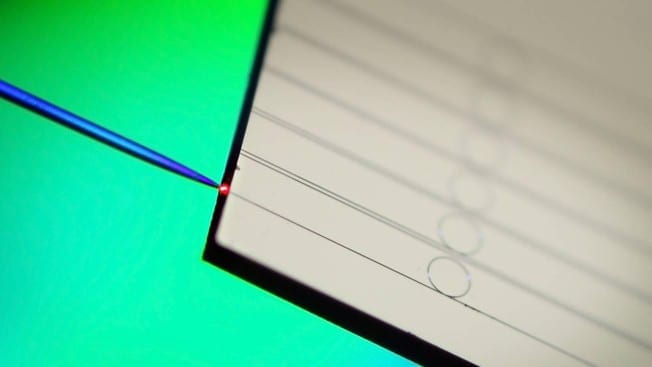
An artists’ rendition of microparticles flowing through a channel and passing through electric fields, where they are detected electronically and barcode-scanned.
Rutgers researchers invent technology that could lead to wearable biosensors
Imagine wearing a device that continuously analyzes your sweat or blood for different types of biomarkers, such as proteins that show you may have breast cancer or lung cancer.
Rutgers engineers have invented biosensor technology – known as a lab on a chip – that could be used in hand-held or wearable devices to monitor your health and exposure to dangerous bacteria, viruses and pollutants.
“This is really important in the context of personalized medicine or personalized health monitoring,” said Mehdi Javanmard, an assistant professor in the Department of Electrical and Computer Engineering at Rutgers University-New Brunswick. “Our technology enables true labs on chips. We’re talking about platforms the size of a USB flash drive or something that can be integrated onto an Apple Watch, for example, or a Fitbit.”
A study describing the invention was recently highlighted on the cover of Lab on a Chip, a journal published by the Royal Society of Chemistry.
The technology, which involves electronically barcoding microparticles, giving them a bar code that identifies them, could be used to test for health and disease indicators, bacteria and viruses, along with air and other contaminants, said Javanmard, senior author of the study.
In recent decades, research on biomarkers – indicators of health and disease such as proteins or DNA molecules – has revealed the complex nature of the molecular mechanisms behind human disease. That has heightened the importance of testing bodily fluids for numerous biomarkers simultaneously, the study says.
“One biomarker is often insufficient to pinpoint a specific disease because of the heterogeneous nature of various types of diseases, such as heart disease, cancer and inflammatory disease,” said Javanmard, who works in the School of Engineering. “To get an accurate diagnosis and accurate management of various health conditions, you need to be able to analyze multiple biomarkers at the same time.”
Learn more:Lab on a Chip Could Monitor Health, Germs and Pollutants
[osd_subscribe categories=’lab-on-a-chip-5′ placeholder=’Email Address’ button_text=’Subscribe Now for any new posts on the topic “LAB-ON-A-CHIP’]
The Latest on: Lab-on-a-chip
[google_news title=”” keyword=”lab-on-a-chip” num_posts=”10″ blurb_length=”0″ show_thumb=”left”]- Amazon Sales Surge as Company Focuses on AIon April 30, 2024 at 8:11 pm
The company reported record first-quarter sales as the AI boom powered growth in its cloud-computing unit, helping Amazon continue to shake off last year’s postpandemic slump.
- Grounded: How To Get The Haze Lab BURGL Chipon April 30, 2024 at 3:45 pm
However, players must find ways to navigate the Haze and to obtain the Haze Super Chip, one of the many BURG.L chips to discover in the game's Secret Labs that are essential to progress and help the ...
- Which Lab Should You Go To First In Grounded?on April 22, 2024 at 4:23 am
To craft a Gas Mask, you’ll need a Weevil Gnose, Gnat Fuzz, Crude Rope, and a Stinkbug Part. The Stinkbug Part is the hardest piece to get, as Stinkbugs can be strong early-game enemies that require ...
- Mini brains and lab-on-a-chip wearables: Jumar Bioincubator officially begins its mission to build "Australia's next CSL"on April 17, 2024 at 5:00 pm
Ovulation bio-sensing startup Symex Labs has developed a wearable "lab-on-a-chip" solution that provides continuous "set-and-forget" monitoring of hormones to more conveniently and effectively predict ...
- New diagnostic tool achieves accuracy of PCR tests with faster and simpler nanopore systemon April 8, 2024 at 12:04 pm
The nanopore optofluidic chip used in the new diagnostic system, with a PCR thermocycler in the background for comparison. The new system could easily fit into a researcher’s lab or clinician ...
- An Introduction to Lab-on-a-Chip Technology in Clinical Diagnostics: Successes and Remaining Challengeson March 26, 2024 at 12:00 am
Lab-on-a-chip platforms enable advanced processing, manipulation, and analysis of biological samples in miniaturized fluidic devices. Despite the numerous advantages, such as lower reagent and sample ...
- Lab on a Chip News and Researchon November 1, 2023 at 5:00 pm
Researchers described the development and applications of a 3D-printed lab-on-a-chip device that quickly detected the presence of SARS-CoV-2 in patient's saliva. A University of Texas at Arlington ...
- Particle Accelerator… On A Chipon October 30, 2023 at 5:06 am
you usually think of some giant cyclotron with heavy-duty equipment in a massive mad-science lab. But scientists now believe they can create particle accelerators that can fit on a chip smaller ...
- Lab on a Chipon October 18, 2023 at 9:17 am
These must represent a significant development in the particular field, and are judged according to originality, quality of scientific content and contribution to existing knowledge. Although there is ...
- New approach to complete automation in sizing and quantitation of DNA and proteins by the Automated Lab-on-a-Chip Platform from Agilent Technologieson October 25, 2022 at 9:48 am
The newly introduced Agilent 5100 Automated Lab-on-a-Chip Platform (ALP) offers a high-throughput system to overcome the limitations of slab gel analysis in protein and DNA sizing and quantitation.
via Google News and Bing News










